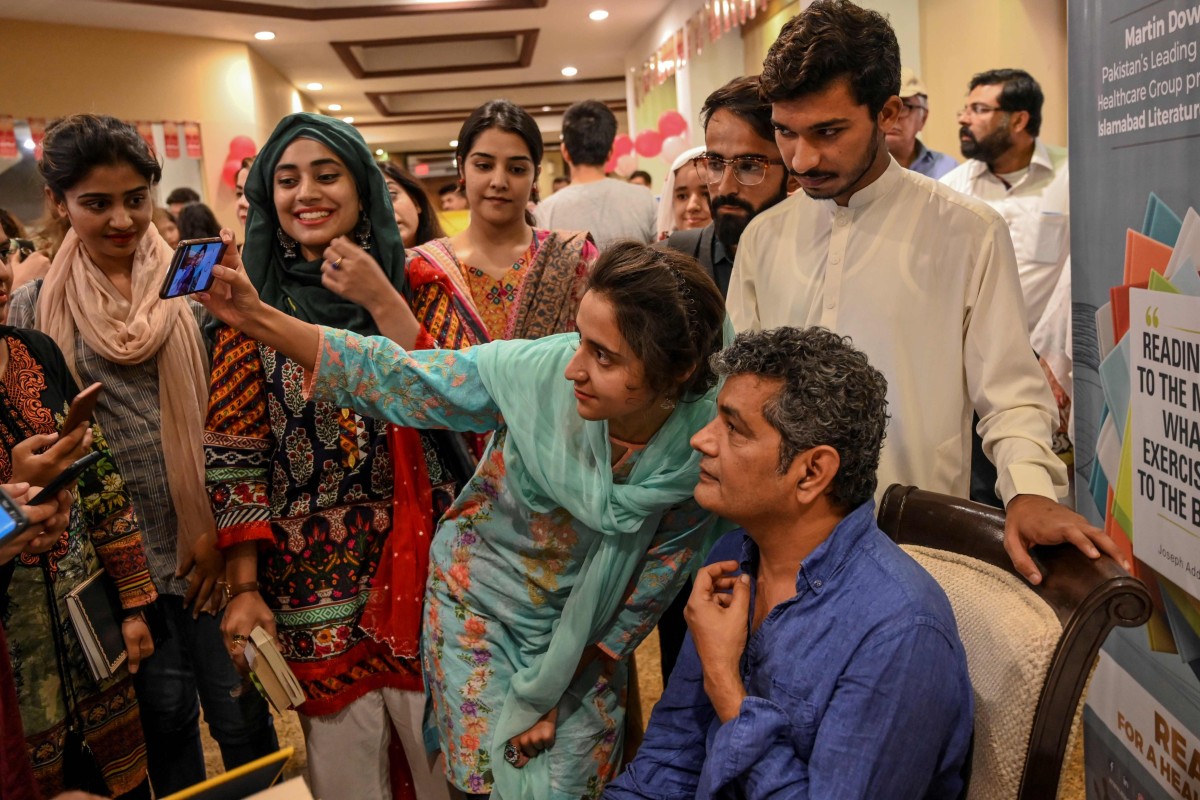- The 2008 novel chronicles the final days of hardline dictator General Zia-ul-Haq’s rule and the conspiracies behind the plane crash that killed him in 1988
- Works written in English have a narrower, elite audience and so often have greater leeway, while Urdu content tends to be more carefully censored.

Featuring bumbling generals, assassination plots, and homosexual romance, Pakistani military satire A Case of Exploding Mangoes by Mohammed Hanif has finally been released in the country’s official language Urdu – even as the army tightens its grip on freedom of expression.The former fighter pilot turned journalist, novelist and librettist is best known for the 2008 novel which chronicles the final days of hardline dictator General Zia-ul-Haq’s rule and the myriad conspiracies behind the plane crash that killed him in 1988.
Zia, a pious and far-right dictator in real life, is portrayed by Hanif as a paranoid buffoon backing the Afghan jihad against the Soviets while battling a case of rectal worms.
Although the book contains heavy doses of humour, the book also unleashes harsh criticism at Pakistan’s military establishment.
In the book, the military relies on torture, extrajudicial murder, and covertly supports a jihadist insurgency to pursue its goals – accusations made by rights activists in real life, but which the military denies, and rarely allows to be repeated by the Pakistani press.
“I love the army. Some of my best friends have died in combat. I have nothing against the institution,” explains the 55-year-old, whose own years in uniform provided much of the granular details of military life featured in the book. “But if the military does something wrong, if they get involved in politics, if they disappear people, then I have to write about it.”
His book was set in Zia’s Pakistan but first released in English – the language of Pakistan’s small, educated elite – during the violent rule of another military dictator, Pervez Musharraf.
It coincided with Hanif’s return to Pakistan after spending nearly 12 years in London with the BBC.
“Some of my journalist friends were scared for me,” he recalls. “I was lucky because 2008 was a particularly bad year in Pakistan with a lot of bloodshed,” including the onset of the Pakistani Taliban insurgency, which likely “distracted” potential censors.
Internationally, the novel earned glowing reviews and was longlisted for the Booker Prize, with critics comparing Hanif to famous satire writers Joseph Heller and Kurt Vonnegut.
If the military does something wrong, if they get involved in politics, if they disappear people, then I have to write about itMohammed Hanif
Despite the widespread praise, more than a decade passed before the novel was translated into Urdu – Pakistan’s other official language, and more widely spoken by the masses.
Works written in English have a narrower, elite audience and so often have greater leeway, while Urdu content tends to be more carefully censored.
According to Hanif, a publisher “sat” on the Urdu translation of the book for years, citing potential repercussions. But “the time for a backlash has passed”, according to the book’s publisher Hoori Noorani.
“The book had been translated into all major languages of the world,” Noorani says. “Even though it is a satire and humour can be subversive, it depicts a dark part of our history.”
Even so, the book’s Urdu release last month comes as authorities have increasingly cracked down on all forms of dissent.
Journalists have complained of the worst censorship since Zia’s time, while opposition leaders are rounded up in a controversial anti-corruption campaign. As such, the Urdu edition is “very timely,” says Harris Khalique, a poet and rights activist.
“Thirty years after the assassination of Zia, writers and journalists are experiencing similar pressures,” he adds.
Noorani is hoping to sell a few thousand copies – a decent number in a country with low literacy rates and an ongoing economic downturn that he says has forced some people to “choose between buying a book or food”.
Since the book’s success, Hanif has gone on to publish two more novels: Our Lady of Alice Bhatti – the story of a nurse from the Christian minority fighting against patriarchy – and last year’s Red Birds , which focuses on war and refugees.
Hanif has also helped co-create a much anticipated opera about the late Pakistani Prime Minister Benazir Bhutto, all while pumping out regular op-eds for The New York Times.
As a columnist, Hanif has established himself as one of the premier voices on all things Pakistan – from the gender politics of making roti to criticism of the army, which saw one of his columns replaced with a blank page in the Pakistani print edition of the paper in 2017.
He admits there are limits – saying his 2013 book about human rights abuses in restive Balochistan province “would be difficult to write now”.
Like most in Pakistani media, he admits to “self-censoring” mostly out of fear of putting his family at risk.
“I have pushed the boundaries,” Hanif says. “But I’m now more careful than I’ve ever been in my life.”
https://www.scmp.com/news/asia/south-asia/article/3038207/pakistani-novel-mohammed-hanif-satirises-military-and-its

No comments:
Post a Comment